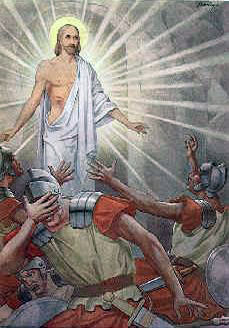Is Jesus the Trinity?
A trinitarian ought to say No. But why? Doesn’t he accept “the deity of Christ”?
A trinitarian ought to say No. But why? Doesn’t he accept “the deity of Christ”?
 John Biddle (1615-62) (also spelled “Bidle”) has been called “the father of English Unitarianism.” (But he didn’t use the word “unitarian” – that had yet to be coined, as a more descriptive, less polemical alternative to “Socinian.”) When he taught his theology publicly, he ran afoul of the the law, and eventually died in jail, imprisoned for his beliefs.
John Biddle (1615-62) (also spelled “Bidle”) has been called “the father of English Unitarianism.” (But he didn’t use the word “unitarian” – that had yet to be coined, as a more descriptive, less polemical alternative to “Socinian.”) When he taught his theology publicly, he ran afoul of the the law, and eventually died in jail, imprisoned for his beliefs.
Here are three of the six articles of his A Confession of Faith Touching the Holy Trinity, According to Scripture. (1648, reprinted in a 1691 book, itself reprinted in 2008.) I have modernized his spelling and use of capitals and punctuation, and have added emphases in bold.
Article I: I believe that there is one most High God, creator of heaven and earth, and first cause of all things pertaining to our salvation, and confessedly the ultimate object of our faith and worship; and that this God is none but the Father of our Lord Jesus Christ, the first person of the Holy Trinity. (p. 1)
Article II: I believe that there is one chief Son of the Most High God,Read More »John Biddle’s unitarian confession of the Holy Trinity
“I had come to this belief truly just through studying the Word.”
Do I ignore “the” being/Person distinction?
I’ve seen this passage quoted by at least three of my favorite Christian philosophers. Unfortunately, they’ve misattributed it to the famous English antitrinitarian John Biddle (also spelled Bidle) (1615-62). I believe it was Keith Yandell who found it in this old book, where it is misattributed to Biddle. Why did the theologian Leonard Hodgson make this mistake? I’ve seen a copy of the book, the… Read More »“an Error in counting…” Who wrote this?
 In part 1 I argued that Bowman attributes a non-existent fallacy to unitarians. After this faltering start, things get better. Continuing his pre-emptive rebuttal, Bowman argues that there is nothing about the roots of the Hebrew and Greek words translated “spirit” that requires them to mean a force or energy. Surely, this is correct, and his examples show this.
In part 1 I argued that Bowman attributes a non-existent fallacy to unitarians. After this faltering start, things get better. Continuing his pre-emptive rebuttal, Bowman argues that there is nothing about the roots of the Hebrew and Greek words translated “spirit” that requires them to mean a force or energy. Surely, this is correct, and his examples show this.
In the end of his pre-emptive rebuttal, Bowman attributes this argument to unitarians:
I suspect that some current day unitarians do endorse this argument. (Does Burke?) Christians of any stripe who believe in any sort of Hell, in souls, or that the NT more clearly reveals the character of the Father, would probably reject 1. For these sorts of reasons, I reject it myself. In my view progressive revelation is different from the Islamic idea of “abrogation” (later Quranic verses contradicting and cancelling out or over-ruling earlier ones). Progressive revelation doesn’t involve contradiction of something earlier asserted, but rather clarifying something previously unclear, and contradicting things one might have inferred from what was formerly asserted. But back to Bowman.
Bowman opines that the OT unclearly hints at the Spirit being a distinct divine person, but he wants to say that this truth is only first clearly revealed in John 14-16. I think this puts him far off of patristic exegesis, btw – but maybe that’s a good thing.
The real meat of Bowman’s case is his exegesis of the books of John and Acts. His first positive argument is essentially this. Jesus promised that after leaving, he’d send “another Paraclete”Read More »SCORING THE BURKE – BOWMAN DEBATE – ROUND 4 PART 2 – BOWMAN
A while back I posted on a short, popular piece by Biola theologian Fred Sanders. He’s now responded. I’m going to continue the conversation, I hope shedding light on the differing assumptions and methods of present-day academic theologians and philosophers. I agree with Fred that responses-to-responses are usually boring. Here’s a greater crime: a (long) response to a response to a response. 😛
I guess what set me in motion was his claim, which struck me as unreasonable, that it’s a good thing that there’s no “Trinity verse” in the Bible – i.e. one which explicitly and clearly states the doctrine.
In fact, up until I think some time in the late 19th c., trinitarians thought they had something pretty close:Read More »Cross-Cultural Dialogue: Theologian and Philosopher
I’ve been working on my Trinities book today, and have been reading a lot of Origen (d. c. 253) lately. As is well known, most of his famous On First Principles (kindle, hardback) has been lost in the original Greek, but we have a “complete” copy of a Latin translation made by Rufinus of Aquileia (d. 410) in 398-9. Unfortunately, this translation was made in… Read More »Rufinus’s corruption of Origen’s On First Principles – Part 1
 Princeton philosopher Thomas Kelly in a paper on the epistemology of disagreement (i.e. what the reasonable response when we find the people just as smart and informed etc. as us disagree on some important matter):
Princeton philosopher Thomas Kelly in a paper on the epistemology of disagreement (i.e. what the reasonable response when we find the people just as smart and informed etc. as us disagree on some important matter):
In principle, we ought to be able to give due weight to the available reasons that support a given view, even in the absence of actual defenders of the view who take those reasons as compelling. But in practice, the case for a view is apt to get short shrift in the absence of any actual defenders. The existence of actual defenders can serve to overcome our blindspots by forcefully reminding us just how formidable the case is for the thesis that they defend… But the case for a given view itself is no stronger in virtue of the fact that that view has actual defenders…
Thomas Kelly, ” The Epistemic Significance of Disagreement,” p. 31 (in pre-print).
At first this reminded me of a proverb I’ve often thought of when reading some catholic theologian who has evidently never put the slightest effort into understanding the overall case for unitarianism:
“The first to speak in court sounds right–until the cross-examination begins.” Proverbs 18:17 (NLT)
But this is actually a different point than Kelly’s. A better courtroom analogy for Kelly’s point is:Read More »Arguing against no one
“The Gospel is Trinitarian.” What does this mean, and is it both true and non-trivial?
A response to a response to my paper “When and How in the History of Theology Did the Triune God Replace the Father as the Only True God?”

Like about everything else these days.
In this post I want to explore what to me is the oddest and hardest part to grasp of the constitution trinitarianism. When I first read their paper, I thought they thought God was a stuff – that is, that the term “God” referred to a certain thing, that immaterial stuff they call “the divine essence”. That was wrong on two counts. For as we’ve seen, “the divine essence” isn’t supposed to be a thing (although they think it wouldn’t be a catastrophe if they admitted it was a thing – see their footnote 10). Hence, it can’t be a thing which is identical to God. Second, they don’t think that “God”, say, when used in a Psalm, refers to that stuff. So, what do they think it refers to? It depends. They hold that it’s a systematically ambiguous term. Why is that?Read More »Constitution Trinitarianism Part 5: Ambiguous God-talk
What happened after the famous council at Nicea in 325? Was there rejoicing and peace, now that the “Arian” controversy had been definitively settled? Sadly, no.
What sort of being is “God” supposed to be? Your answer to this will constrain your options when it comes to thinking about the Trinity. The “Trinity” (in the primary sense of the term) is supposed to be none other than the triune God, the tripersonal God of officially catholic traditions since the late 4th century. In other words, the Trinity and God are supposed… Read More »10 steps towards getting less confused about the Trinity – #2 Get clear about “God”

Of all the ancient catholic “fathers” I’ve read, Origen (c.185-254) is the most impressive as a scholar.
It’s not that I usually agree with him – any non-Platonist is going to choke on many of the dishes he’s serving, and I think that most today would take issue with some his ways of interpreting the Bible. But he has vast knowledge, he makes pretty careful distinctions, he knows how to argue, and is just a much more developed and original thinker than most. Any contemporary who was going to square off with him either did or should have considered him a formidable opponent.
He wrote, or rather dictated, a vast amount – evidently, he did little else. Some think he may have been the most prolific person in antiquity. We still have a fair number of texts from him.
He’s historically important for many reasons, but for this post, what’s most important is that in the 3rd century he was considered a stalwart of mainstream (“catholic”, or “proto-orthodox”) Christianity.
Lately I’ve been reading Origen’s Commentary on John, as translated by Ronald E. Heine, who by way, I have found very helpful. He too is a first-rate scholar.
Evidently, passage here is directed against certain monarchians who thought (or at least, were alleged to think) that the Father = the Son, i.e. that the Son is the Father himself and vice versa. This passage struck a nerve with me, as it reminded me of conversations I’ve had.
The references in brackets are from Heine’s footnotes.Read More »Origen: the Son is not the Father
“Ok, I’ve finished watching your presentation, and below is my careful critique of it. … Enjoy.”
I take it the purpose of the debate is whether or not “the” doctrine of the Trinity is derivable from the Bible. What is this doctrine, exactly? The burden falls on Bowman to be clear about just what doctrine is in view; he’s making the positive case. Here’s what he says: 1. There is one (true, living) God, identified as the Creator. 2. This one… Read More »SCORING THE BURKE – BOWMAN DEBATE – Bowman 1
Two common uses of “Trinity,” but one came first…